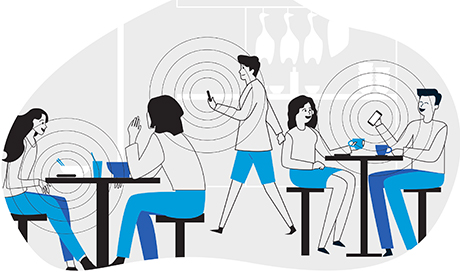Tracing those who have been exposed to Covid-19 is an important step in winding down socially and economically crippling lockdowns.
Manual tracing is resource-intensive and ineffective. A number of countries, including Singapore and Australia, have adopted smartphone apps using Bluetooth.
New Zealand seems likely to follow a similar path.
These apps vary in detail but all work along more or less the following lines:
- Users download the app onto their smartphone and enable Bluetooth.
- Identifying information is required but converted into an anonymised ID.
- When a phone with the app installed comes within a specified distance, for a specified time, of another phone with the app, encrypted contact information is exchanged.
The exchanged information remains on users’ phones for the period someone with the virus might have transmitted it to others.
At the end of that period – probably 14 to 21 days – the information is automatically deleted.
If one of the users is diagnosed with Covid-19, a health professional will give them a code which automatically sends a signal to all contacts on the app and the user’s app may change colour, perhaps turning red.
When users receive such a signal (their app may also change colour, perhaps turning orange) they will be required to self-isolate or be tested. If they isolate, their app will return to its default colour (say, green) at the end of the specified isolation.
If they opt for a test, a health professional will give them a code which will turn their app green if negative, and red if positive.
As with all potentially intrusive technological initiatives, these apps raise important ethical issues addressed in the following guidelines.
Benefits must outweigh risks
Ultimately, the ethical justification of tracing apps rests upon their capacity to deliver significant benefits to communities and individuals in ways which respect legitimate concerns about consent, privacy, and fairness.
This means there is an obligation to identify benefits and risks. Risks must be recognised and accepted, mitigated as far as possible and outweighed by countervailing benefits.
Use must be voluntary
One significant difference between approaches to contact tracing is the extent to which they require user consent.
Australia and Singapore encourage but do not require citizens to use their apps and New Zealand seems certain to take a similar approach. The app will work on a person’s phone only if they download it, enable Bluetooth and carry their phones with them.
The voluntary approach carries some risks, with uptake the most obvious barrier.
Estimates of uptake levels required to deliver the benefits of the app vary between 40 and 60 percent.
Below those levels, too many contacts of confirmed cases will not be registered and won’t be contacted automatically.
Concerns about uptake have led some governments – Israel, Poland, South Korea – to set aside individual consent. But consent is the most obvious way we show respect for the moral agency of others and we should not set it aside lightly.
More practically, regulations that lose common support are rarely successful: compulsion is usually not very effective.
So consent is crucial: Those downloading and enabling such apps must explicitly consent to their functions, and must have access to clear and understandable information about how it works, and what they need to do if they receive a positive diagnosis or a signal indicating they have been in contact with an infected person.
To ensure consent is informed, there must be as much transparency as possible about how the apps work and about the processes they set in train.
Apps must not be used beyond Covid-19
There is a predictable and reasonable concern that such apps might be used for purposes other than Covid control.
For example, just who has this suspected drug dealer been in contact with in the past fortnight?
Guarantees must be provided such apps will be used only for Covid-19 management, and they must have a use-by date after which they will cease to function.
Ethical concerns
There are a cluster of related ethical concerns around privacy, confidentiality, and security. The apps and processes around their use must:
- be designed and implemented to minimise the impact on privacy, with guarantees around limited use;
- minimise the use of identifiable information and protect any identifiable information which is used;
- be designed and implemented in ways that prevent unauthorised access to information and misuse of the app or its processes.
Equity issues
The impacts of Covid-19 have not been felt equally across the community.
Tracing apps could exacerbate legitimate concerns for fairness and equity. For instance, socially and economically disadvantaged individuals and groups are less likely to have access to smartphones, but the benefits and burdens of these apps should be delivered equitably across the community.
Efforts must be made to identify and address likely inequities in the uptake and use of tracing apps to address social and economic disadvantage. Continue reading
Additional readingNews category: Analysis and Comment.




